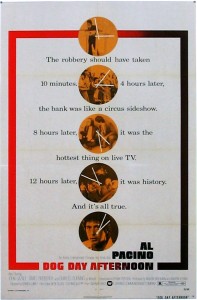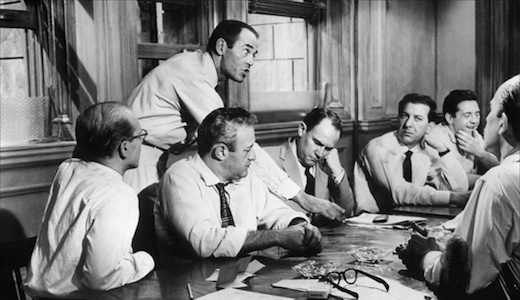 American writer and director Sidney Lumet, nominated for multiple Oscars including 12 Angry Men, Network and Dog Day Afternoon, has died aged 86 at his home in Manhattan. Described by esteemed critic Roger Ebert as “one of the finest craftsmen and warmest humanitarians among all film directors”, his career spanned over six decades of television and cinema. His films not only helped cement the careers of Al Pacino, Peter Finch and Henry Fonda, but his films helped cement an era of filmmaking – several eras in fact.
American writer and director Sidney Lumet, nominated for multiple Oscars including 12 Angry Men, Network and Dog Day Afternoon, has died aged 86 at his home in Manhattan. Described by esteemed critic Roger Ebert as “one of the finest craftsmen and warmest humanitarians among all film directors”, his career spanned over six decades of television and cinema. His films not only helped cement the careers of Al Pacino, Peter Finch and Henry Fonda, but his films helped cement an era of filmmaking – several eras in fact.
Lumet was instrumental in building the sophistication of television as a storytelling medium, successfully adapting a number of Broadway and off-Broadway plays into the television format and later being one of the first directors to successfully make the leap to cinema. The son of veteran players – his father was an actor, director, producer and writer, and his mother was a dancer – he made his debut on the Yiddish stage as an actor at the age of four. Although interrupted by the Second World War, his career continued afterwards as part of the Actor’s Studio, where his skills in directing earned him his first television gigs. Amongst his productions was a television version of 12 Angry Men, a play he would later adapt for his highly successful debut feature in 1957. Indeed, Lumet made history with an Oscar nomination for Best Director with this first film. It would also earn a Best Picture nomination for its star and producer Henry Fonda, and a screenplay nod for Reginald Rose’s adapted screenplay, virtually a copy of his original television script.
Lumet’s films, alternating between television and cinema, became known for their politically charged nature, their studied levels of detail and the powerhouse acting from their leads. After his debut feature explored the injustices of the justice system, it was his work of the 1970s that drove a nail directly into the heart of the system. “Always a New York director…Lumet is at his best among the cops, crooks and corruption of the city” (Bergan, 2006, p.328). Beginning with Serpico (1973), Lumet explored the corrupt heart of his home in New York city, demonstrating that a cop working against the broken system was fighting an uphill battle and earning his star Al Pacino an Oscar nomination and his first Golden Globe award for acting.
Combined with his highly realistic style of directing, in which the camera was unobtrusive in the style of realist directors, Lumet’s ‘golden era’ of filmmaking allowed viewers to feel the sweat and grime of his New York. This is perhaps demonstrated in Dog Day Afternoon (1975), a film with an almost documentary feel. Based on the real-life story of two bank robbers who captured media attention in an attempt to get money for John Wojtowicz’s (played by Al Pacino as Sonny Wojtowicz) partner’s sex reassignment surgery. Christopher Null notes that the movie “captures perfectly the zeitgeist of the early 1970s, a time when optimism was scraping rock bottom and…Wojtowicz was as good a hero as we could come up with”. Putting a spotlight on media frenzy and the over-saturation of journalistic attention on sensationalist stories, Lumet would complete what could almost be considered his loose ‘trilogy’ with the brilliant Network (1976). The film, which earned Academy Awards for Paddy Chayefsky’s script and for actors Peter Finch, Faye Dunaway and Beatrice Straight, was “the story of Howard Beale, the first known instance of a man who was killed because he had lousy ratings”.
Lumet continued to write and direct in the decades that followed, with an eclectic mixture of crime and fantasy. The 1978 musical The Wiz, based on The Wizard of Oz, starred Michael Jackson (The Scarecrow), Diana Ross (Dorothy) and Richard Pryor (The Wiz), and gave a distinctive picture of New York in the process. His later hit, The Verdict, earned him and star Paul Newman Academy Award nominations. Lumet was awarded an honorary Academy Award at the 2004 Oscars, an Academy Award for Lifetime Achievement for his “brilliant services to screenwriters, performers, and the art of the motion picture”.
Lumet proved that he wasn’t done with his final picture, Before The Devil Knows You’re Dead (2007) earning critical acclaim, appearing on numerous Top 10 lists and being honoured as one of the ten most influential American motion pictures and television shows of 2007 at the American Film Institute Awards 2007.
He is survived by his wife Mary Gimbel, and his two daughters, one of whom is screenwriter Jenny Lumet (Rachel Getting Married). His style and influence will long remain a part of future filmmakers, especially any who thinks to pick up a camera in New York City.
References:
Bergan, R. (2006) Film. DK: London.
The Reel Bits is the cinema arm of DVD Bits. DVD Bits can be found on Twitter @DVDBits and The Reel Bits @The_ReelBits. DVD Bits is at http://www.dvdbits.com.







